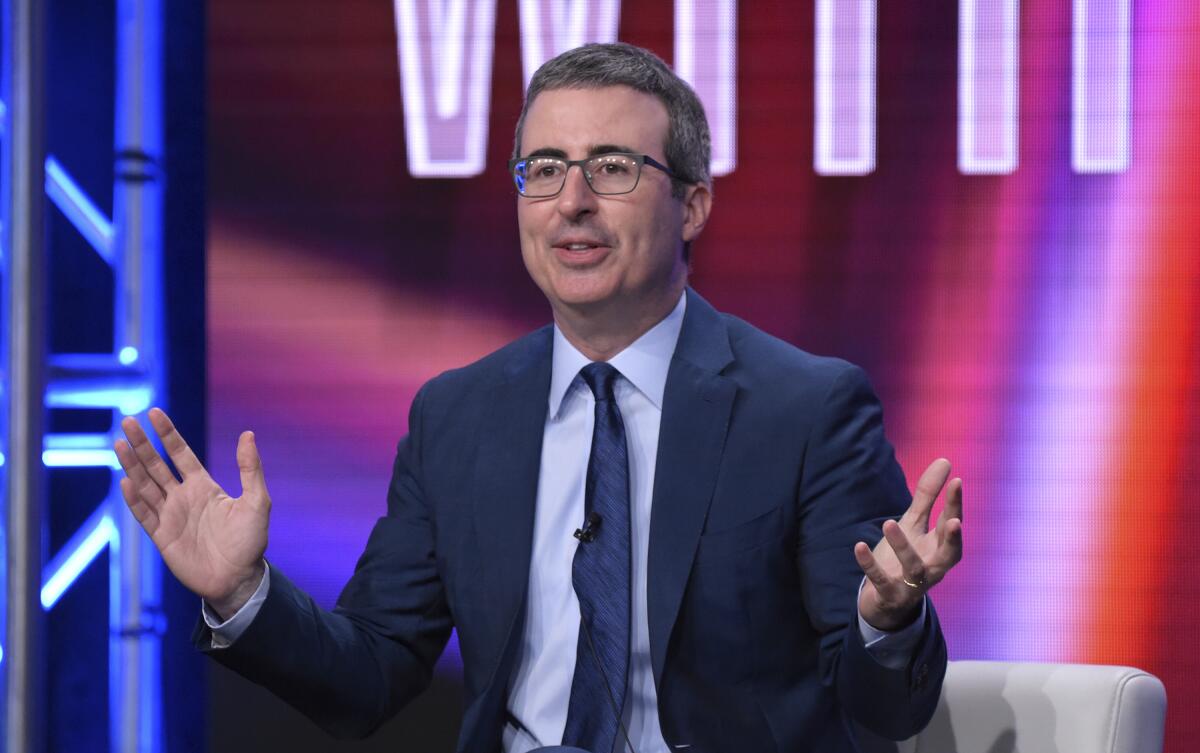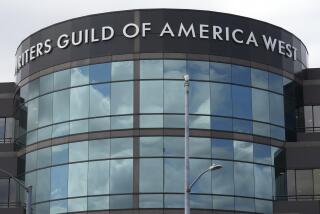What shows would stop first if Hollywood writers strike? Here’s what the WGA says

- Share via
Say goodbye to your favorite late-night show if Hollywood’s writers cannot cut a deal with studios by May 1.
That’s the message the Writers Guild of America is delivering to entertainment investors and analysts as the screenwriters’ union ratchets up pressure on studios amid contract negotiations. If the two sides can’t reach an agreement, it will result in the first work stoppage by the WGA in 15 years.
In a Thursday memo obtained by The Times, the WGA said a May strike could delay the key fall network television season. The season contributes a third of all episodes produced, including 45% of the episodes produced by legacy media companies Disney, Paramount Global and Comcast NBCUniversal.
And streaming platforms, with their vast libraries of shows to flick through, would not be safe either, as platforms that carry broadcast shows would be hobbled by delays as writing on new shows ends.
“Immediately, new episodes of late-night shows including ‘Jimmy Kimmel Live!,’ ‘The Tonight Show Starring Jimmy Fallon,’ ‘Real Time With Bill Maher,’ ‘Late Night With Seth Meyers,’ ‘Saturday Night Live,’ ‘Last Week Tonight With John Oliver,’ and others would cease,” the WGA said.
Streaming has transformed television and led to a surge in content, but it also has squeezed Hollywood writers. Five Writers Guild of America members share their stories.
Writers are seeking increased pay, particularly from streaming residuals, and new regulations on working conditions. The WGA has sought pay increases and other changes to the contract valued at nearly $600 million, at a time when studios are being roiled by cutbacks and layoffs, with many under pressure to make their streaming services more profitable.
The union in its memo highlighted that writers typically work in May and June for shows due for release in September and October, and any delay to that writing could lead to a postponing of fall season premieres and reduce the amount of programming.
“This will have a knock-on effect for the streaming services of the legacy media companies, which rely on new broadcast episodes to populate their services,” the WGA said. The memo highlighted Walt Disney Co. and Paramount as producing the most WGA-covered dramas and comedy episodes, 890 and 860 respectively, in the 2021-22 season.
The Alliance of Motion Picture and Television Producers (AMPTP), which represents studios such as Disney, Apple, Amazon and Paramount in bargaining, had no immediate comment.
The group has said its goal is to reach a fair agreement with the Writers Guild.
“An agreement is only possible if the Guild is committed to turning its focus to serious bargaining by engaging in full discussions of the issues with the companies and searching for reasonable compromises,” the AMPTP said.
The union warned that back in 2007, when it went on strike for 100 days, the conflict ended in the loss of about a fourth of prime-time scripted programming for the 2007-08 network season. Broadcast networks soon ran out of new episodes to air. Many were forced to play more reruns of older shows and more reality TV instead.
While Netflix has said it is well positioned to get through a strike, other streaming platforms carry broadcast programming the day after air.
A strike also could jeopardize the industry’s upcoming advertising upfronts scheduled for May, with fewer episodes produced leading to a possible hit on revenues from licensing shows to international networks and streaming services, the WGA said.
Restructuring, layoffs and show cancellations at Hollywood studios, as well as the risk of a pending writers strike, slowed film and TV production.
Some analysts have said studios including Paramount and Warner Bros. could benefit from a strike in the short term because they would be able to cut costs associated with programming.
Writers voted by a historic margin — 98% in favor among 9,218 ballots cast — for strike authorization, which allows union leaders to call a walkout if they are unable to negotiate a new contract. The earliest a strike could happen is May 2.
More to Read
Inside the business of entertainment
The Wide Shot brings you news, analysis and insights on everything from streaming wars to production — and what it all means for the future.
You may occasionally receive promotional content from the Los Angeles Times.













